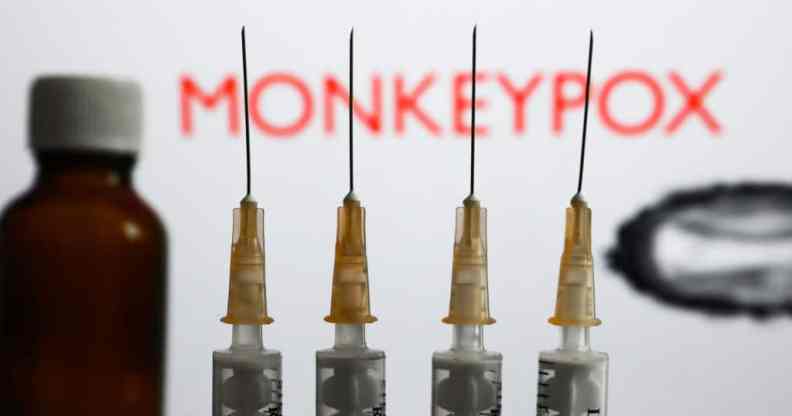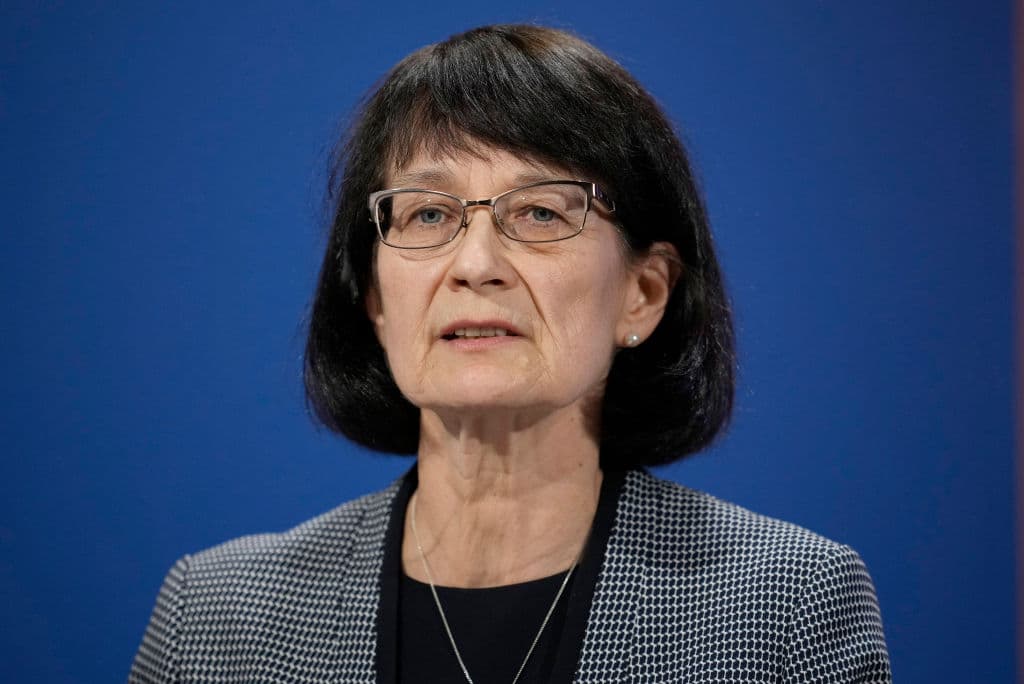Monkeypox: Leading sexual health charity cuts ties with government over ‘serious concerns’

Medical syringes and a bottle are seen with a ‘Monkeypox’ sign. (NurPhoto via Getty/ Jakub Porzycki)
The Terrence Higgins Trust, one of the UK’s biggest sexual health organisations, is withdrawing from monkeypox meetings with the UK government over its mishandling of the outbreak.
Monkeypox has been spreading in the UK and across the world for months, with cases primarily detected among gay and bisexual men.
In a statement, the Terrence Higgins Trust said it was withdrawing support from the UK Health Security Agency’s (UKHSA) monkeypox response after the government body failed to address “serious concerns”.
The charity said a “strongly targeted health campaign” that targets gay and bisexual men is “urgently needed” – something that the Terrence Higgins Trust has raised consistently in recent months with the UKHSA.
However, the organisation said its pleas have been met with silence, with a letter to the UKHSA’s chief executive Jenny Harries going unanswered.
Issues raised ‘consistently’ for months
“It’s with regret that we are withdrawing our support from UK Health Security Agency’s approach to engaging gay and bisexual men in protecting their health during the country’s ongoing monkeypox outbreak,” Dominic Edwards, director of communications at the Terrence Higgins Trust said.
“The overwhelming majority of monkeypox cases continue to be in gay and bisexual men and a sustained, multi-channel campaign targeted at this community is needed to protect this group’s health and prevent monkeypox from becoming endemic in the UK.
“It’s crucial we reach those at high risk who still need to be vaccinated, those needing to access a second dose and those currently managing the risk through changing their sexual behaviour.”
Edwards continued: “We have raised this consistently for months in the UKHSA’s communications meetings, but appropriate action has still not been taken.
“We firmly believe that a strongly targeted health campaign is a necessity to stop monkeypox from becoming endemic and that the money must be found to implement it.”
The UKHSA has thanked the Terence Higgins Trust for it’s work helping to raise awareness of monkeypox, but stands by its approach.
“We are not complacent and will continue to ensure that everyone has the information they need to stay safe,” it says in a statement to PinkNews.
“Cases of monkeypox are low and this is thanks to a combination of the vaccine and changes in behaviour, based on information that UKHSA has published.”
‘Serious concern’ over monkeypox approach
The Terrence Higgins Trust’s statement comes after the charity wrote to Jenny Harries, chief executive of the UKHSA, in September.
In that letter, the charity’s chief executive Ian Green said he had “serious concerns” about the UKHSA’s “communication and health promotion approach to monkeypox”.
Green told Harries that, without adequate funding, key messaging on monkeypox would not get through to gay and bisexual men.
“We have serious concerns about the current approach of only using organic communications.” He cited research which found that just 30 per cent of men who have sex with men trust government websites as a source for reliable information.

Jenny Harries, chief executive of the UK Health Security Agency. (Matt Dunham – WPA Pool/Getty)
Green told Harries that community organisations might have greater trust, but that they “can only reach those already engaged”.
“Free one-off messaging through platforms such as Grindr, without a user-tested multi-touch point paid for campaign, is not enough.”
Green said they had been told the UKHSA would have to request funds from the Cabinet Office for a paid-for campaign.
“We offered to support UKHSA officials with this process six weeks ago and have raised this in every meeting since,” he wrote.
“We now have doubts about UKHSA’s willingness to pursue this approach. To date we have attended at least 30 meetings to discuss the communications response and feel we have exhausted opportunities to raise this in the group.”
‘Left behind’
Green said gay and bisexual men were being “left behind” by the government’s response. He said the Terrence Higgins Trust’s approach to the outbreak was “at odds” with that of the UKHSA.
“It is therefore with regret that I am writing to you to say that without a substantial improvement in the communications approach from UKHSA, we will have to withdraw our support for UKHSA’s communications approach to monkeypox and cease our participation in the external partners weekly communications meeting.”
Closing out his letter, Green told Harries that the Terrence Higgins Trust would “stand ready” to support the government’s response to monkeypox “wherever we can be impactful”.
“I hope that we can continue to work constructively with UKHSA.”
The Terrence Higgins Trust received no response to its letter.
The UK’s handling of the monkeypox outbreak has been hampered by lack of vaccines and an apparent unwillingness within government to order adequate supply.
When news broke in August that the UK was about to run out of vaccines, activists told PinkNews the UKHSA’s modelling on vaccination projections was wrong.
Ceri Smith, head of policy at the Terrence Higgins Trust, told PinkNews at the time that they and the British Association for Sexual Health and HIV (BASHH) estimated 125,000 people would need to be vaccinated against monkeypox.
Smith said the government was only planning on vaccinating between 60,000 to 75,000 people.

